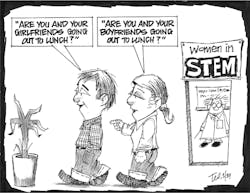Over my 50-year career in the automation profession, the best performers in terms of communication skill complementing technical capability were mainly women. However, many of them moved on to other professions where they felt more at home, and their verbal aptitude more valued.
We are fortunate that the ISA mentor program has Leah Ruder and Angela Valdes as resources, and several protégées (e.g., Caroline Cisneros, Danaca Jordan, Christine Joy Panganiban, Ashley Weckwerth and Marsha Wisely) with whom I have done Control Talk Columns or ISA Mentor Program Q&A Posts. Danaca Jordan, our first protégée, has also participated in the feature articles “Process Generations Talk to Each Other” and “Enabling New Automation Engineers,” and has done an ISA Mentor Program Webinar, “Basics of Vacuum Control.”
As I was standing in the Mimic simulation software booth at a User’s Group exhibition hall, Diane Doise, a very experienced automation engineer at a major plant, stopped by and started an interesting and humorous dialog. Diane is the Outreach Chair for the Society of Woman Engineers, Baton Rouge. I thought she would be a great person to feature in a Control Talk column. This first column focuses on neglecting the opportunity to benefit from the contributions of more women in the workplace. Future columns with Diane will focus on technical problems and solutions.
Greg: What are the percentages of woman engineers?
Diane: About 20% of engineering graduates are women—of course, it varies with types of engineering degrees. However, only about 12% of practicing engineers are women. Many women leave engineering because of the workplace culture. We have “Outreach” and “Women in STEM” programs, but many females don’t see engineering as a desirable career for women. Science shows women with high math scores also have high verbal scores. This gives them a lot of career options outside of engineering.
Greg: What is making the engineering workplace undesirable?
Diane: Unconscious bias plays a large role in our organizational culture. This bias is engrained into how our brains work—a universal, deeply engrained stereotype. We like people who are similar to ourselves. The workplace was designed by men with men in mind. This is seen in little things we don’t even realize we are doing. It’s not malicious, it’s the way we were raised and trained. So, the approach to helping women succeed is often to “fix” the women, effectively turning them into men. There is recognition of the value of diversity and inclusivity in the workplace, but we haven’t been successful in achieving gender equality in the workplace.
Greg: How can we turn this around and take advantage of the perspectives and skills of women?
Diane: We need men to help women make this cultural change in the workplace (12% can’t change 88%). For example, men had to vote to give women the right to vote. Men must become advocates for more gender diversity. One way to do this is by addressing their unconscious biases. The problem is not just at the beginning of the career pipeline, but at the end. Unless there is change, women will continue to leave the engineering field and engineering will continue to not be seen as a woman-friendly career. This causes not just loss of talent, but the company investment in an employee.
Men can watch for biases and take actions to make the workplace more inclusive. Diversity doesn’t work unless there is inclusion.
Greg: What are the biases?
Diane: I recently went out to lunch with some women who are all engineers—two in their 20s, one in her 30s and in middle management, and two in their 40s—and discussed several gender biases. It’s important to realize that these biases are generally not malicious, but are mostly due to our culture and a lack of awareness. We talked about three different types of gender bias:
Bro talk: The use of objectifying language, such as “chick,” “girl,” “sissy,” “honey,” “sweetie” and “babe.” If you wouldn’t say it to a man, you shouldn’t say it to a woman. I’m trying to stop using “girl” to refer to an adult woman. Generally, when a man calls another man a “boy,” it’s in a negative context. This language makes a woman feel less than her male counterparts. Gender should also not be inserted into an accolade. For example Instead of saying “great job for a woman,” simply say “great job.” Additionally, our language uses male plural references like “you guys,” which is gender-exclusive. For once, the South is doing something right—we use “y’all,” which is gender-neutral. We need to be more conscious of what we say and how it affects others.
Interrupting: Women are interrupted, ignored or shut down at an alarming rate in the workplace. Women are coached to speak up, but then when we do, are then told to “turn it down.” The problem is largely unintentional. Women being told to disengage is not good for the bottom line. We need to seek women’s input despite sounding different. We need to encourage women to speak up and actively engage them. Saying “no interruptions” as an up-front rule in a meeting can be helpful to everyone, and if you see it, help out by stopping the interrupter and asking them to wait for the speaker to finish.
Tightrope: Women constantly walk a tightrope at work. Do we want to be competent or to be liked? Women are pushed back for behavior seen as too masculine. The more successful a man, the more the man is liked, but it’s not the same for women. The difference between being assertive and aggressive is not as wide for women. I have experienced the need in expressing and employing my confidence to not be too bold. And, men seem to have less empathy if a woman is being held back or disvalued.
Being seen as not feminine enough has affected our ability. Ask if a woman being categorized as “aggressive” is doing something different than a male coworker. If women are getting the same results, they should get the same promotions. Ambitious women in the engineering culture are being pushed back rather than being pulled up into leadership. We need to change how we see behavior. Gender shouldn’t matter. I don’t want to be a “lady.” I don’t want to give up the floor. This unconscious bias is very damaging to women engineers’ success in the workplace. By increasing our awareness, we can change and benefit from inclusivity.
People who are most successful as business leaders have high emotional awareness. We need to realize that if a person rubs you the wrong way, it may be because you have opposite personalities. So, how do I change my behavior and like them and then they like me? It becomes a tightrope. How do we get the full benefit of people’s skills and knowledge if there are different sets of rules for women and men?
Research-based reports on gender bias and why women leave engineering, plus much more info can be found on the Society of Women Engineers website, www.research.swe.org. The book I found enlightening is written by engineers: (Un)Skirting the Issues, by Bonnie Fetch and Jessica Poliner (included in Kindle Unlimited).
Greg: I had a personality test that showed my personality can be categorized foremost as being sympathetic and open, next as analytical, then as being social (largely through humor) and very little as being assertive. My verbal SAT scores were as high as my math scores. This explains why I do the Control Talk column, many articles and books plus the Mentor Program to share knowledge and advance the profession. It also explains why the knowledge is not being directly used as much as anticipated. I learned to change my “checklists,” asking people to consider an extensive list of problems and solutions to be “best practices” stating directly what needs to be done. Knowing your personality can be quite helpful. You can make corrections and address your limitations.
Diane: I’m extroverted. I speak a second or so ahead of my thoughts. I find it better to jot down my ideas instead of injecting them spontaneously. Recognizing who you are and your strengths and weaknesses is helpful. It might be a natural reaction, but as humans we have the logic and ability to change. My natural tendency is big-picture thinking, but I’ve had to learn how to be more detail-oriented to be a successful controls engineer.
Greg: I thought the message was inspirational that Glenn Close gave in her award acceptance speech for the 2019 Golden Globe Awards. She said, “We have to find personal fulfillment. We have to follow our dreams. We have to say, I can do that and I should be allowed to do that.”
Learn about Putman Media's Influential Women in Manufacturing program, which honors women making a difference in all manufacturing fields.
10. Don't say it if you wouldn't say it to a man.
9. Ask questions instead of making assumptions.
8. Don't call an adult a girl.
7. Question your gut reaction.
6. Call out others using Bro-talk.
5. Be aware of how often you complement a women's appearance.
4. Don't interrupt, listen.
3. Solicit input from everyone at the table.
2. Judge women objectively on their results.
1. Be an inclusion role model.
Latest from Asset Management

Leaders relevant to this article:





